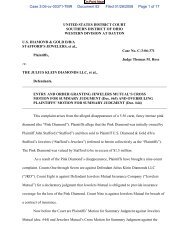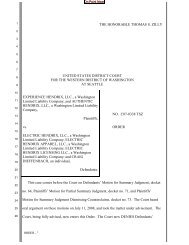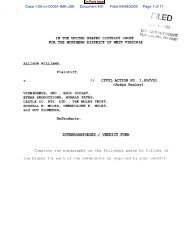Defendant's motion to dismiss - On Point News
Defendant's motion to dismiss - On Point News
Defendant's motion to dismiss - On Point News
You also want an ePaper? Increase the reach of your titles
YUMPU automatically turns print PDFs into web optimized ePapers that Google loves.
<strong>On</strong> <strong>Point</strong> <strong>News</strong><br />
Cason, the <strong>to</strong>rt of invasion of privacy was not intended <strong>to</strong> be duplicative of some other <strong>to</strong>rt.<br />
Rather, this is a <strong>to</strong>rt in which the focus is the right of a private person <strong>to</strong> be free from public<br />
gaze.” Id. (emphasis added). Here, as in Allstate, there is no allegation that any private<br />
information was published <strong>to</strong> the public. Accordingly, Plaintiff’s claim for invasion of privacy<br />
fails as a matter of law.<br />
IV.<br />
PLAINTIFF’S CLAIM FOR CONVERSION FAILS AS A MATTER OF LAW.<br />
It is well settled that a conversion is an unauthorized act which deprives another of his<br />
property permanently or for an indefinite time. Mayo v. Allen, 973 So. 2d 1257, 1258-59 (Fla.<br />
1st DCA 2008) (citing Star Fruit Co. v. Eagle Lake Growers, Inc., 33 So. 2d 858 (1948);<br />
General. Fin. Corp. of Jacksonville v. Sex<strong>to</strong>n, 155 So. 2d 159 (Fla. 1st DCA 1963)). Conversion<br />
may be demonstrated by a plaintiff’s demand and a defendant’s refusal. See Goodrich v.<br />
Malowney, 157 So. 2d 829, 832 (Fla. 2d DCA 1963) (“The purpose of proving a demand for<br />
property by a plaintiff and a refusal by a defendant <strong>to</strong> return it in an action for conversion is <strong>to</strong><br />
show the conversion. The generally accepted rule is that demand and refusal are unnecessary<br />
where the act complained of amounts <strong>to</strong> a conversion regardless of whether a demand is made.”).<br />
Here, the Complaint does not allege any unauthorized conduct of Defendant that deprived<br />
Plaintiff of any property. Defendant’s alleged conduct in accessing voicemail and text messages<br />
on her telephone and deleting text messages is insufficient as a matter of law. First, voicemail<br />
messages and text messages are not personal property capable of conversion. Teleco, Inc. v.<br />
Southwestern Bell Telephone Co., 392 F. Supp. 692, 697 (D.C. Okl. 1974) (holding that “[t]he<br />
right <strong>to</strong> telephone service is not personalty or personal property which is capable of being<br />
converted”); see also Express <strong>On</strong>e International, Inc. v. Steinbeck, 53 SW.3d 895, 900-01 (Tx.<br />
Ct. App. 2001) (holding that using a screen name <strong>to</strong> impersonate someone on the internet fails <strong>to</strong><br />
establish conversion as a matter of law because a screen name is not personal property). Second,<br />
16429223.3<br />
6
















